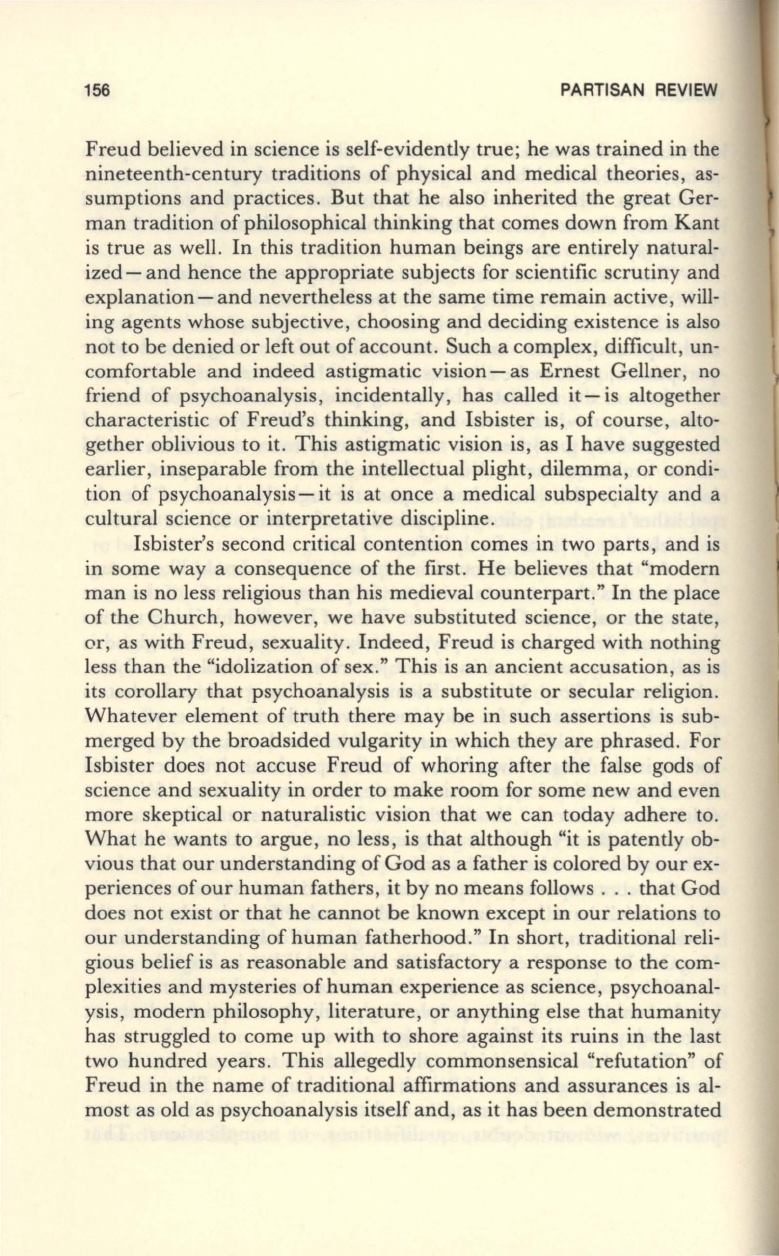
156
PARTISAN REVIEW
Freud believed in science is self-evidently true; he was trained in the
nineteenth-century traditions of physical and medical theories, as–
sumptions and practices. But that he also inherited the great Ger–
man tradition of philosophical thinking that comes down from Kant
is true as well. In this tradition human beings are entirely natural–
ized - and hence the appropriate subjects for scientific scrutiny and
explanation - and nevertheless at the same time remain active, will–
ing agents whose subjective, choosing and deciding existence is also
not to be denied or left out of account. Such a complex, difficult, un–
comfortable and indeed astigmatic vision - as Ernest Gellner, no
friend of psychoanalysis, incidentally, has called it - is altogether
characteristic of Freud's thinking, and Isbister is, of course, alto–
gether oblivious to it. This astigmatic vision is, as I have suggested
earlier, inseparable from the intellectual plight, dilemma, or condi–
tion of psychoanalysis - it is at once a medical subspecialty and a
cultural science or interpretative discipline.
Isbister's second critical contention comes in two parts, and is
in some way a consequence of the first. He believes that "modern
man is no less religious than his medieval counterpart." In the place
of the Church, however, we have substituted science, or the state,
or, as with Freud, sexuality . Indeed, Freud is charged with nothing
less than the "idolization of sex." This is an ancient accusation, as is
its corollary that psychoanalysis is a substitute or secular religion.
Whatever element of truth there may be in such assertions is sub–
merged by the broadsided vulgarity in which they are phrased. For
Isbister does not accuse Freud of whoring after the false gods of
science and sexuality in order to make room for some new and even
more skeptical or naturalistic vision that we can today adhere to.
What he wants to argue, no less, is that although "it is patently ob–
vious that our understanding of God as a father is colored by our ex–
periences of our human fathers, it by no means follows ... that God
does not exist or that he cannot be known except in our relations to
our understanding of human fatherhood." In short, traditional reli–
gious belief is as reasonable and satisfactory a response to the com–
plexities and mysteries of human experience as science, psychoanal–
ysis, modern philosophy, literature, or anything else that humanity
has struggled to come up with to shore against its ruins in the last
two hundred years. This allegedly commonsensical "refutation" of
Freud in the name of traditional affirmations and assurances is al–
most as old as psychoanalysis itself and, as it has been demonstrated


